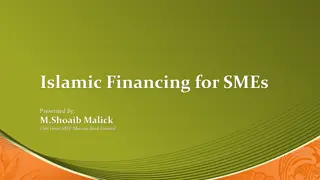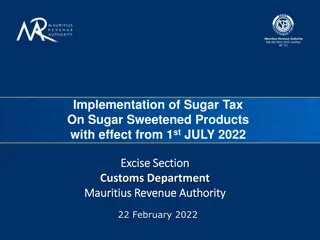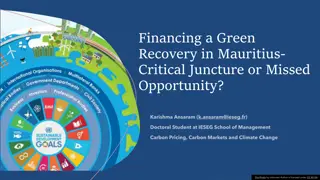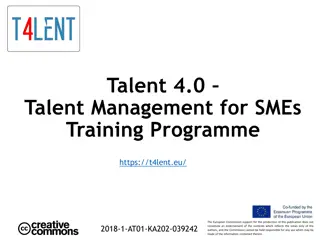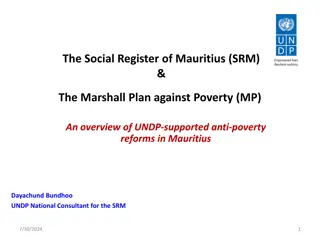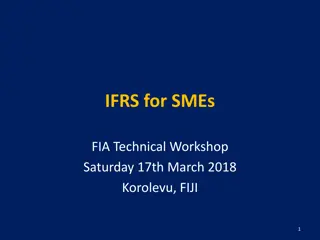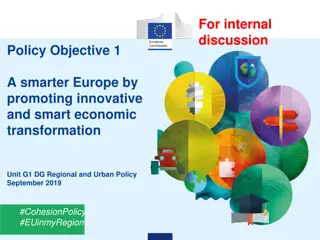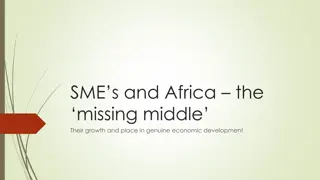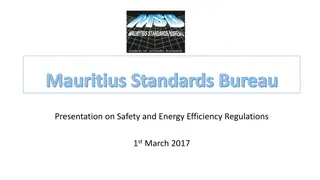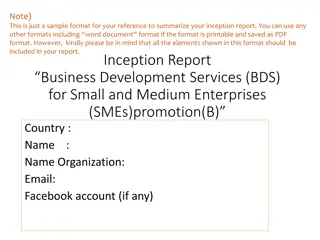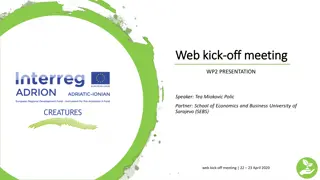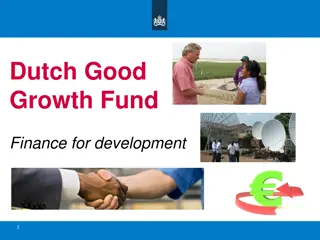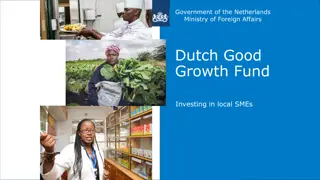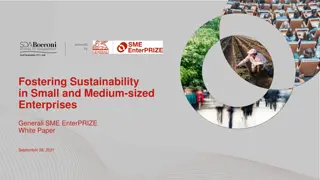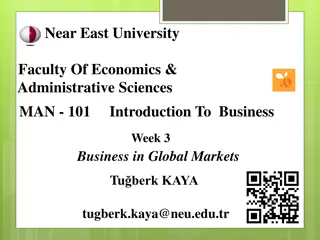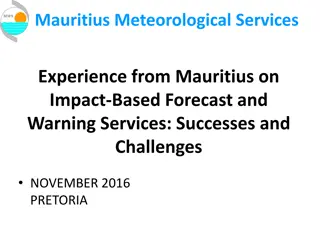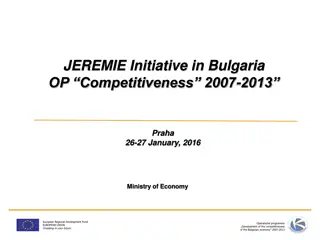Enhancing Competitiveness of Exporting SMEs in Mauritius
Explore the efforts to boost the competitiveness of exporting SMEs in Mauritius under the Economic Partnership Agreement. Key focuses include the SME landscape, challenges faced, regulatory frameworks, and the 2026 SME Master Plan aimed at improving productivity, fostering entrepreneurship, and enhancing market access.
Download Presentation

Please find below an Image/Link to download the presentation.
The content on the website is provided AS IS for your information and personal use only. It may not be sold, licensed, or shared on other websites without obtaining consent from the author. Download presentation by click this link. If you encounter any issues during the download, it is possible that the publisher has removed the file from their server.
E N D
Presentation Transcript
ENHANCING COMPETITIVENESS OF EXPORTING SMES UNDER THE ECONOMIC PARTNERSHIP AGREEMENT KNOWLEDGE SHARING ON TRADE AND INVESTMENT GOOD PRACTICES KNOWLEDGE SHARING ON TRADE AND INVESTMENT GOOD PRACTICES TRADECOM II PROGRAMME TRADECOM II PROGRAMME 22 FEBRUARY 2018
OUTLINE OUTLINE SMES MAURITIAN LANDSCAPE KEY CHALLENGES FOR MAURITIAN SMES TRADECOM PROJECT ON EXPORT COMPETITIVENESS GAPS AND CONTRAINST WAY FORWARD
SME LANDSCAPE IN MAURITIUS Definition of SMEs in Mauritius An enterprise with less than USD 1.5 million in annual sales Contribution to the Economy 40% of GDP 55% Employment (301,000 workers out of 552 000) Less than 3% Exports In terms of value addition: USD 5 billion Aim : to make SMEs the engine of growth -Projected to contribution around 50% of the GDP by 2026 and increase exports to 18%
Regulatory & Institutional Framework KEY CHALLENGES Marketing and export capacity Export Ready Entrepreneur Culture Human Capital Access to finance Innovation and technology
RESTRUCTURING SME ENVIRONMENT IN MAURITIUS-Development of the 2026 SME Master Plan oObjective 1: Improve SME competitiveness and growth through improved productivity, better quality products and resiliency to compete in the global economy; oObjective 2: Foster high growth potential SMEs by : nurturing start-ups and fostering entrepreneurship supporting knowledge-based activities and disruptive (innovators) SMEs oObjective 3: Upgrade skills and job opportunities address skill mismatch/ and upgrade human capital oObjective 4: Support SMEs to improve design and value addition research, development, innovation oObjective 5: Increase market access and exports o Market intelligence &market development
TRADECOM PROJECT Start date: August 2017 OBJECTIVES Enhance the business environment for exporting SMEs; and Promote exports of the Mauritius private sector including SMEs, Women and Young Entrepreneurs OUTCOME: Improve ability of SMEs to become export ready
Project Implementation 32 SMEs selected based on an agreed set of criteria taking into account the country- wide SME strategy and new pillars of the economy -Sectors: Textile and Apparel; Agro-products and Foodstuff; Jewellery; Light Manufacturing and Engineering (e.g. optical, medical, plastics, innovative products); - Innovation component: Goods and/or services involving new technologies or ground-breaking business models; - Ownership: Business owned and managed by either women entrepreneurs or youth entrepreneurs; - Existing and potential export markets: Enterprises already exporting or those considered close to export readiness.
GAPS AND CONSTRAINTS Lack of SME sector has been let out information on Market access Access to finance SMEs had several visits of experts and training but did not help to solve their issues Lack or absence of institutional support for SMEs Lack of Knowledge of markets to be targetted Existence of various schemes for SMEs but not many can benefit from Lack of management and financial management skills Lack of knowledge of export clients Limited export client database Communication of schemes and facilities not efficient No handholding is being carrried out by relevant institutions Lack of knowledge on marketing of products Problems with quality on export markets
Project Implementation Quality management appears to be one of the main challenges faced by the selected businesses. Visiting the SMEs allowed for an assessment of their individual needs. The key issues are related to their management, production processes and products. Development of a Quality Standards Guide which was validated at a one day workshop held with the selected SMEs Result 1.1: Enhanced capacities of quality and standards in support of SMEs competitiveness attained
Findings on Quality Management Sector Number of companies visited with some international standards Companies complying Companies seeking to comply with (more) international standards 1 1 Companies looking for support on compliance Type of support needed Apparel Agro-food 6 3 6 3 0 2 Information about - EU rules - ISO 9001 - HACCP IT Jewellery 2 3 (1) 3 0 1 0 1 Information about ISO 9001 Information about ISO 9001 Others 6 2 2 2 TOTAL 20 14 (+1) 5 5
Project Implementation Developing a business model for an European Business Information centre (EBIC). The proposed solutions are based on three case studies, i.e. Zimbabwe, Malaysia and Singapore s experience in delivering export promotion and business intelligence services Initially to be hosted by Enterprise Mauritius Institutional Reforms lead to creation of Economic Development Board (EDB) regrouping Enterprise Mauritius, Board of Investment and Financial Services Promotion Agency Proposed assistance to the creation of the EBIC Result 1.2: Increased access to business intelligence services by SMEs
Project Implementation Individual coaching sessions Use of existing market access and export development opportunities through increased understanding of competitors (regional and international) and development of a core competitive advantage. The methodology used to achieve these results is the Business Model Canvas approach which leads to defining a Unique Selling Proposition (USP) of each company, defining the Value Proposition to the client. Activity 2.1.1: Delivering business development and export marketing services for enterprises including women-owned businesses
Selection of SMEs by stakeholders and consultants HOW THE HOW THE TRADECOM TRADECOM PROJECT PROJECT DIFFERS FROM DIFFERS FROM OTHER OTHER PROJECTS PROJECTS Handholding aspect of each individual SME by the consultants Each enterprise is being visited by the Consultants Working on their weaknesses and providing solutions to improve their performance
SME Mauritius along with Business Mauritius (Representing the private sector) and Association of Mauritian Manufacturers are working together to ensure the sustainability of the project. Assistance end in March 2018 An MOU is in the process of being signed between the above institutions backed by a concept note on the modus operandi of the project s next phase The Consultants have, in this respect, been working together with the organisations to ensure a transfer of expertise and knowledge Project Sustainability Other SMEs will also be able to benefit from such an approach.
Crucial element: follow up on the project Way forward The recommendations of the study to be monitored by SME Mauritius Ltd, a Government-owned Company, which has the mandate to promote and develop entrepreneurship, and provide the necessary support to SME s. A joint public-private working group on SME for Growth (SMEG JWG) will be created, where recommendations that require a collaborative process between public and private stakeholders can be driven. Dedicated assistance to SMEs following constraints identified in respective companies Request for further assistance to implement the recommendations of the study including the appointment of a project manager and facilitators on quality standards Business development, Business Intelligence services



